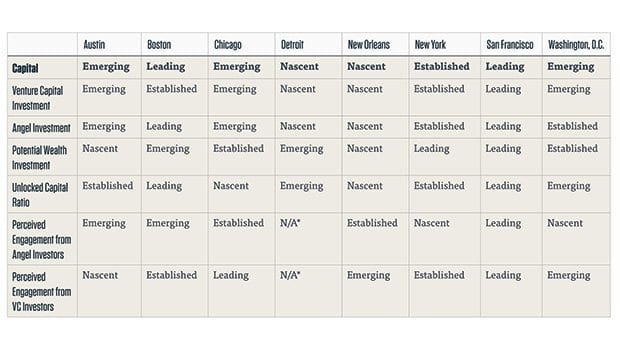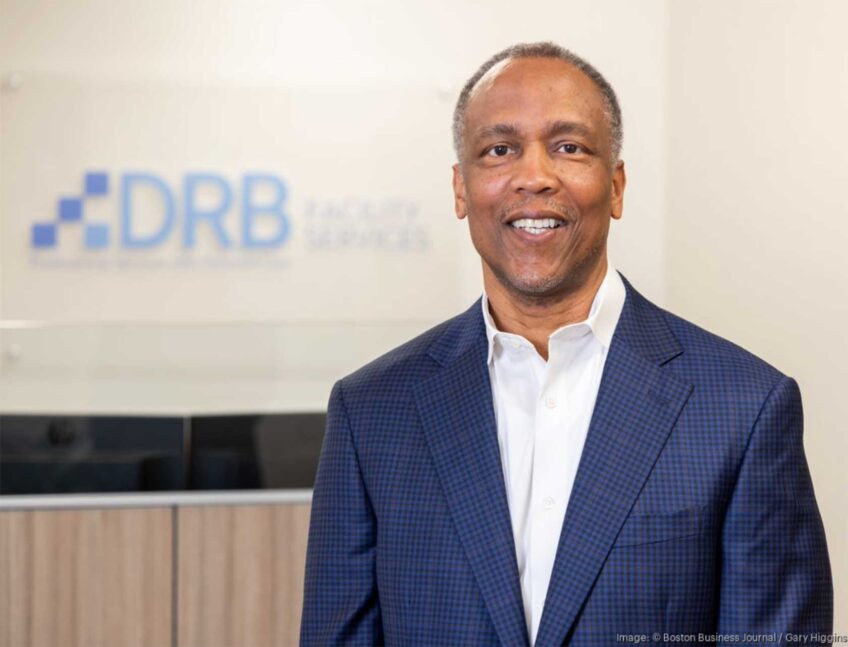Hub ranks high in startup index
Access to capital helps innovative business ventures advance in Boston

A recent report found Boston ranks high among its urban peers with respect to a robust startup environment. That’s largely due to an open network between city institutions and entrepreneurs, as well as access to needed financial capital to get off the ground.
The report, “Innovation That Matters: How City Networks Drive Civic Entrepreneurship,” examines what cities can do to promote the growth of new ventures in industries that matter most to society, such as education, energy, health and local government services. Author Patrick McAnaney, an economic research analyst, says the purpose of his research is to “understand how civic sector startup ecosystems have developed, what challenges actors in these ecosystems currently face, and what more can be done to increase startup activity in ways that benefits society.”
The research was sponsored by Washington D.C. incubator 1776, with support from the U.S. Chamber of Commerce,
Leveraging private sector entrepreneurial activity in the public interest is a theme that Mayor Marty Walsh and his economic development chief John Barros have been promoting for some time. The 1776 report provides evidence for dissenters that the city’s efforts are making headway.
There’s more. U.S. Small Business Administration Executive Director Maria Contreras-Sweet was in Boston recently to kick-off a new startup support program that streamlines the license and permitting process. Small business support organizations dot the city’s economic landscape. Boston officials go out of their way to connect with and listen to entrepreneurs of all types, from all sectors.
That’s exactly what Innovation That Matters praises as part of a startup mentality and entrepreneurial values.
Civic sector innovation
Many people laud the tech sector’s strong startup ecosystem. In its analysis, the 1776 report shows that cities can drive innovation in the civic sector by adopting the tech approach.
That means moving away from highly–regulated, static thinking — a major reason why health-care systems continue to cost more and can’t handle demand, why public schools often underperform and most local governments face constant budget cuts. New approaches promise a brighter future.

The Network Effect
“Innovation That Matters” concentrates on eight U.S. cities — Austin, Boston, Chicago, Detroit, New Orleans, New York, San Francisco and Washington, D.C. — to discern best practices other cities might apply. The site-specific inquiry included roundtable discussions with local officials, entrepreneurs and investors to discuss a city’s strengths, weaknesses, opportunities and challenges.
The report concludes that, first and foremost, building a stronger civic startup ecosystem means building and maintaining an open network for forging partnerships, collaboration and idea sharing.
As author McAnaney writes, “We find that fluid, open networks are the most important element in fostering vibrant communities of civic entrepreneurship because they connect diverse stakeholders within an industry and bridge cultural gaps to allow for effective collaboration. Driving innovation that matters in highly regulated industries requires enabling connections between broad groups of people and institutions to break down networks and promote network growth.”
The report presents five ways to strengthen a city’s civic startup ecosystem:
- Establish system connectivity: Connect local actors — for example, startups, civic institutions, investors, regulators and corporations. Foster a collaborative community that understands the value of entrepreneurial innovation and is not afraid of risk.
- Embrace the friction: Encourage and foster competition within the ecosystem, which enables startups to put their best product forward. Recognize the inevitable conflicts of interest between incumbents and newcomers.
- Build the market: Open new market opportunities for startups that involve working with existing institutions via challenges that focus on existing issues. Develop safe spaces for prototyping products.
- Turn the lights on: Partner with startups to increase access to existing data, build new datasets and improve data flow. Create information that discloses the current state of civic institutions’ operations.
- Unlock hidden capital: Connect a community’s existing assets with the startup community to drive further innovation in civic entrepreneurship.
The report finds that Boston and San Francisco rank high on most of these metrics. Boston, San Francisco and New York are the only cities with established entrepreneurial support networks already in place. And San Francisco and Boston are the only cities that have established across-the-board avenues for connecting startups to financial capital.
But it’s not just the money that matters.
“We support entrepreneurs with a constant flow of people who are intrigued by interesting new ideas. The idea of creating an ecosystem of support is not to just provide services and pathways to investment for the entrepreneurs, but to bring together people who can effectively support each other,” said Gilad Rosenzweig, executive director of Dudley Square-based startup accelerator Smarter in the City. “Initiatives such as ours, or efforts by the city, are essentially making important connections that can then spark or develop businesses.”
Kevin Wiant, executive director of the Venture Café, which operates District Hall in Seaport, the Roxbury Innovation Center and business innovation events in Kendall Square, also acknowledges the importance of a connected startup ecosystem.
“We believe that innovation and entrepreneurship is a social process that is fueled by conversation, collaboration and storytelling. The startup process is also accelerated when there is supportive and nurturing environment in place to assist entrepreneurs through the challenges that they will face,” he said. “Venture Café strives to build out an ecosystem of players that provides this supportive structure of connections. We reach out to groups across the private, nonprofit and government sectors to construct this community.”






